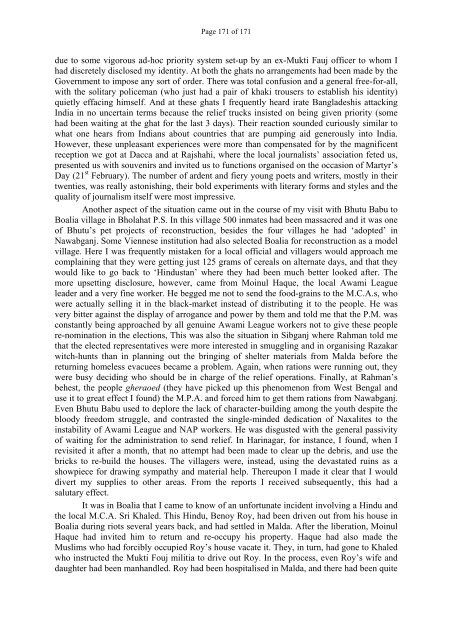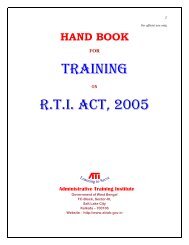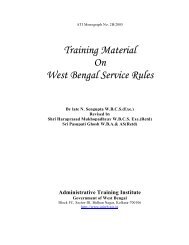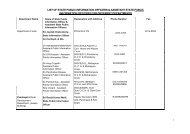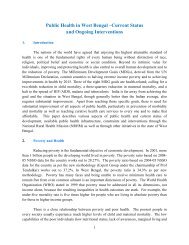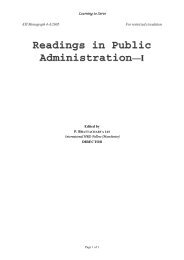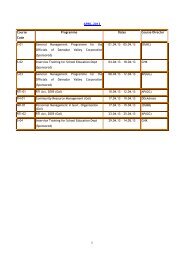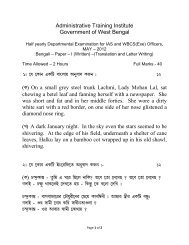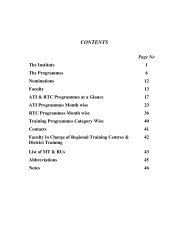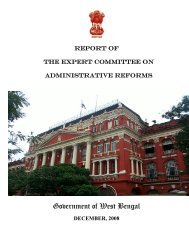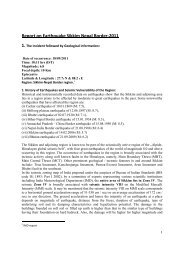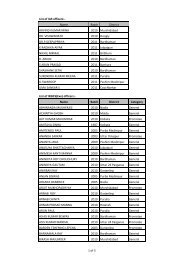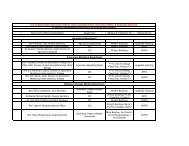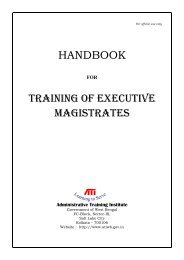Malda Training Diary - Administrative Training Institute
Malda Training Diary - Administrative Training Institute
Malda Training Diary - Administrative Training Institute
Create successful ePaper yourself
Turn your PDF publications into a flip-book with our unique Google optimized e-Paper software.
Page 171 of 171<br />
due to some vigorous ad-hoc priority system set-up by an ex-Mukti Fauj officer to whom I<br />
had discretely disclosed my identity. At both the ghats no arrangements had been made by the<br />
Government to impose any sort of order. There was total confusion and a general free-for-all,<br />
with the solitary policeman (who just had a pair of khaki trousers to establish his identity)<br />
quietly effacing himself. And at these ghats I frequently heard irate Bangladeshis attacking<br />
India in no uncertain terms because the relief trucks insisted on being given priority (some<br />
had been waiting at the ghat for the last 3 days). Their reaction sounded curiously similar to<br />
what one hears from Indians about countries that are pumping aid generously into India.<br />
However, these unpleasant experiences were more than compensated for by the magnificent<br />
reception we got at Dacca and at Rajshahi, where the local journalists’ association feted us,<br />
presented us with souvenirs and invited us to functions organised on the occasion of Martyr’s<br />
Day (21 st February). The number of ardent and fiery young poets and writers, mostly in their<br />
twenties, was really astonishing, their bold experiments with literary forms and styles and the<br />
quality of journalism itself were most impressive.<br />
Another aspect of the situation came out in the course of my visit with Bhutu Babu to<br />
Boalia village in Bholahat P.S. In this village 500 inmates had been massacred and it was one<br />
of Bhutu’s pet projects of reconstruction, besides the four villages he had ‘adopted’ in<br />
Nawabganj. Some Viennese institution had also selected Boalia for reconstruction as a model<br />
village. Here I was frequently mistaken for a local official and villagers would approach me<br />
complaining that they were getting just 125 grams of cereals on alternate days, and that they<br />
would like to go back to ‘Hindustan’ where they had been much better looked after. The<br />
more upsetting disclosure, however, came from Moinul Haque, the local Awami League<br />
leader and a very fine worker. He begged me not to send the food-grains to the M.C.A.s, who<br />
were actually selling it in the black-market instead of distributing it to the people. He was<br />
very bitter against the display of arrogance and power by them and told me that the P.M. was<br />
constantly being approached by all genuine Awami League workers not to give these people<br />
re-nomination in the elections, This was also the situation in Sibganj where Rahman told me<br />
that the elected representatives were more interested in smuggling and in organising Razakar<br />
witch-hunts than in planning out the bringing of shelter materials from <strong>Malda</strong> before the<br />
returning homeless evacuees became a problem. Again, when rations were running out, they<br />
were busy deciding who should be in charge of the relief operations. Finally, at Rahman’s<br />
behest, the people gheraoed (they have picked up this phenomenon from West Bengal and<br />
use it to great effect I found) the M.P.A. and forced him to get them rations from Nawabganj.<br />
Even Bhutu Babu used to deplore the lack of character-building among the youth despite the<br />
bloody freedom struggle, and contrasted the single-minded dedication of Naxalites to the<br />
instability of Awami League and NAP workers. He was disgusted with the general passivity<br />
of waiting for the administration to send relief. In Harinagar, for instance, I found, when I<br />
revisited it after a month, that no attempt had been made to clear up the debris, and use the<br />
bricks to re-build the houses. The villagers were, instead, using the devastated ruins as a<br />
showpiece for drawing sympathy and material help. Thereupon I made it clear that I would<br />
divert my supplies to other areas. From the reports I received subsequently, this had a<br />
salutary effect.<br />
It was in Boalia that I came to know of an unfortunate incident involving a Hindu and<br />
the local M.C.A. Sri Khaled. This Hindu, Benoy Roy, had been driven out from his house in<br />
Boalia during riots several years back, and had settled in <strong>Malda</strong>. After the liberation, Moinul<br />
Haque had invited him to return and re-occupy his property. Haque had also made the<br />
Muslims who had forcibly occupied Roy’s house vacate it. They, in turn, had gone to Khaled<br />
who instructed the Mukti Fouj militia to drive out Roy. In the process, even Roy’s wife and<br />
daughter had been manhandled. Roy had been hospitalised in <strong>Malda</strong>, and there had been quite


